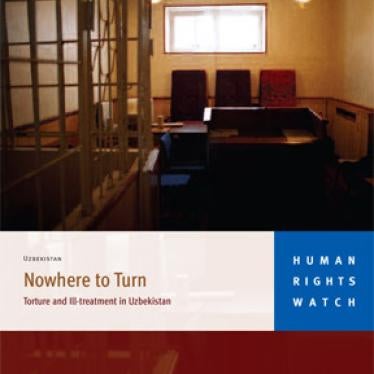Uzbekistan’s government continues to allow torture and ill-treatment in the criminal justice system without holding perpetrators accountable, Human Rights Watch said in a report released today.
Uzbekistan’s record is coming up for scrutiny before the United Nations Committee Against Torture (CAT) on November 9, 2007. November also marks the five-year anniversary of the visit to Uzbekistan by the UN Special Rapporteur on torture, who concluded that torture in Uzbekistan was “systematic.”
The 90-page report, “Nowhere to Turn: Torture and Ill-Treatment in Uzbekistan,” documents widespread torture that goes largely unpunished. The report finds that torture and ill-treatment are ignored and overlooked by investigators, prosecutors, and judges, and generally hushed up by the media and the government.
“Uzbekistan wants to make its multilateral partners believe that it has put an end to torture,” said Holly Cartner, Human Rights Watch’s Europe and Central Asia director. “But official statements simply don’t square with reality.”
The report details the cycle of abuse that starts at the time of an individual’s detention and continues through conviction or beyond to compel confessions or other testimony. In cases documented by Human Rights Watch, police agents manipulated and prevented detainees from having access to counsel of their choice. They beat, kicked and threatened detainees soon after they were first detained, when detainees are cut off from access to third parties or avenues where they might seek redress.
Police and security agents abuse detainees and threaten witnesses, detainees’ families, and sometimes even lawyers to deter them from pursuing accountability.
“This is no marginal problem,” said Cartner. “The Committee Against Torture needs to recognize that ill-treatment in Uzbekistan is endemic to the criminal justice system and not just a problem caused by a handful of rogues.”
While the Uzbek government has given examples of police held accountable for torture, no one was held accountable in the cases documented by Human Rights Watch. Judges did not investigate torture allegations that criminal defendants made in court testimony, and instead alleged that the defendants were lying or told them they should have filed a complaint during the investigation. A 39-year old defendant in one of the trials monitored by Human Rights Watch explained why he could not do this: “I never had a confidential meeting with a lawyer. I know that the pressure would have increased if I had complained. I am a human being. I am not made of iron. Even animals scream when you beat them. I was scared. That is why I did not complain.”
Common methods of torture and ill-treatment include beatings with truncheons and bottles filled with water, electric shock, asphyxiation with plastic bags and gas masks, sexual humiliation, and threats of physical harm to relatives.
The report includes recommendations to the government of Uzbekistan to end torture, and urges the Uzbek government to:
- take immediate and concrete steps to comply with its obligations under the Convention against Torture and other Cruel, Inhuman or Degrading Treatment or Punishment;
- implement in full the February 2003 recommendations issued by the UN Special Rapporteur on torture following his visit to Uzbekistan;
- publicly acknowledge the scale of torture in Uzbekistan;
- conduct a robust, nationwide investigation into the practice of ill-treatment and torture;
- declare what measures it will be taking to ensure the prohibition on torture and other ill-treatment is fully enforced and respected in practice;
- make this information available and accessible to the local population, through the media and other appropriate forums;
- ensure that detainees are informed of their rights, that they have access to confidential meetings with a lawyer of choice, and can communicate unimpeded with their lawyer at trial; and
- hold perpetrators of torture and ill treatment accountable to the full extent of the law and ensure that detainees can make complaints about torture without fearing retribution.
The report also calls on the Committee Against Torture to make full use of the opportunity provided by its review to express concern about the continuing widespread use of torture in Uzbekistan, and to call on the authorities at the highest level to publicly condemn the use of torture. The committee should also emphasize the crucial role played by civil society groups, independent media and international organizations in efforts to combat torture and ill-treatment, and call on the government to ensure that these actors are able to function freely and effectively in Uzbekistan.
Human Rights Watch also called on the international community to support the work of the UN’s anti-torture bodies by advancing the implementation of their recommendations as part of their relations with the Uzbek government.
“International actors should take a principled stance and make ending the use of torture a key component of any dialogue with the government of Uzbekistan,” said Cartner.







